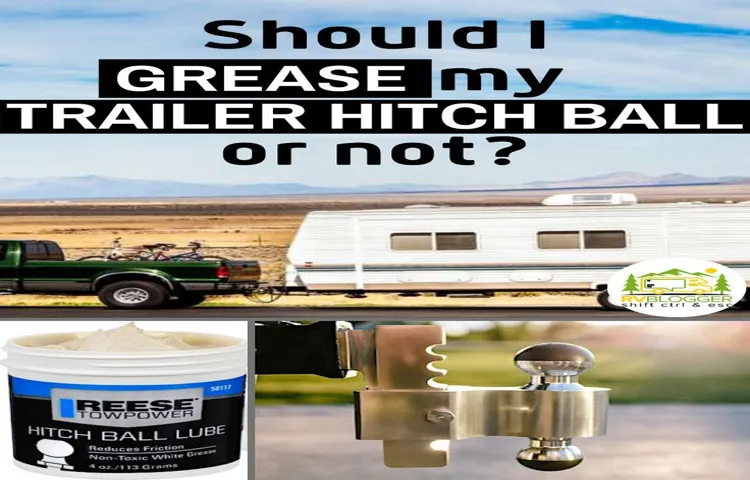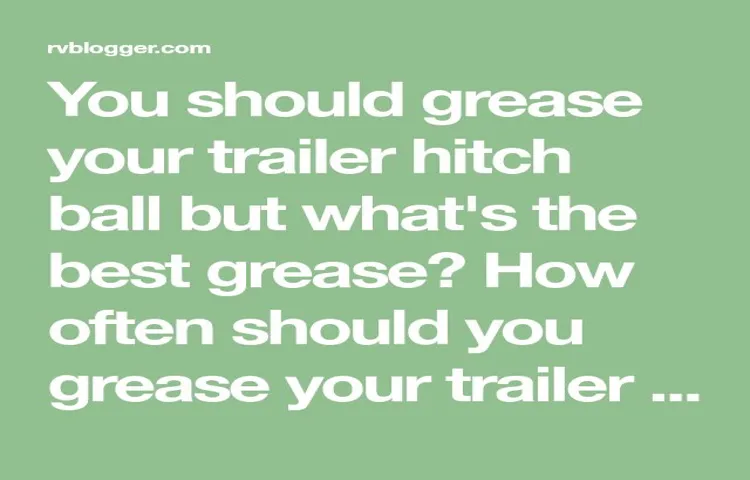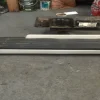Are you a new RV owner or someone who is looking to invest in an equalizer hitch? If so, you may be wondering where exactly you should grease your equalizer hitch for optimal performance. Well, you’ve come to the right place! In this comprehensive guide, we will dive into everything you need to know about greasing your equalizer hitch and the best spots to do it. Think of your equalizer hitch as the backbone of your towing setup.
It distributes the weight evenly across all axles, providing stability and control while towing. But like any mechanical system, it requires regular maintenance to ensure it functions properly. One of the most critical aspects of maintenance is greasing.
Greasing your equalizer hitch not only reduces friction and wear but also prevents rust and corrosion. Just like joints in our body need lubrication to move smoothly, so does your hitch. So, where exactly should you grease your equalizer hitch? There are a few key areas that require lubrication.
First and foremost, you’ll want to focus on the pivot points. These are where the hitch attaches to the trailer frame and where the spring arms connect to the hitch head. Applying grease to these areas will allow for smooth pivoting and minimize squeaking noises.
Additionally, you’ll want to grease the tilt or slide mechanism, depending on the type of equalizer hitch you have. This mechanism allows the hitch head to tilt or slide as needed to accommodate uneven terrain. By greasing this part, you ensure it moves freely, which is vital for maintaining control and stability.
Finally, don’t forget to grease the ball socket on the hitch head. This is where the trailer ball sits and pivots when turning. Applying grease to this area reduces friction, allowing for smooth movement and preventing excessive wear.
Table of Contents
Overview of an Equalizer Hitch
One important maintenance task for an equalizer hitch is applying grease to the necessary components. Greasing an equalizer hitch is essential for ensuring smooth operation and preventing wear and tear on the hitch components. So where exactly should you apply grease? There are several key areas that require lubrication.
First, the hitch ball should be greased to reduce friction and allow for easy movement. Additionally, the spring bars and sockets should be greased to facilitate their movement and reduce noise. It’s also important to grease the pivot points on the weight distribution brackets and the sway control components if applicable.
By regularly greasing these areas, you can extend the lifespan of your equalizer hitch and ensure optimal performance. Remember to use a high-quality, lithium-based grease suitable for automotive applications.
Explaining what an equalizer hitch is and how it works
equalizer hitch

Benefits of using an equalizer hitch when towing
equalizer hitch, towing, benefits
Importance of regular maintenance for the hitch
equalizer hitch An Equalizer Hitch is a crucial component of towing vehicles, as it helps in distributing the weight evenly across the trailer and the towing vehicle. This ensures a smooth and controlled towing experience, especially when dealing with heavy loads or driving on uneven terrain. However, like any other mechanical system, regular maintenance is essential to keep the Equalizer Hitch in optimal condition.
Ignoring maintenance can lead to various issues, such as poor weight distribution, excessive wear and tear, and even safety hazards. Therefore, it is important to understand the importance of regular maintenance for the hitch and take the necessary steps to ensure its longevity and performance.
Identifying the Grease Points on Your Equalizer Hitch
If you’re wondering where you should grease your equalizer hitch, you’ve come to the right place. Greasing the appropriate points on your hitch is crucial for maintaining its functionality and ensuring smooth towing. The key areas to focus on when greasing your equalizer hitch are the spring arms, the jackscrews, and the attachment points.
These are the parts of the hitch that experience the most friction and movement during towing. By applying grease to these areas, you can reduce wear and tear, prevent rust and corrosion, and extend the lifespan of your hitch. So, grab your grease gun and make sure to give these grease points some attention before hitting the road.
Step-by-step guide on locating the grease points
equalizer hitch, grease points. Are you having trouble locating the grease points on your equalizer hitch? Don’t worry, you’re not alone. It can be a bit confusing at first, especially if you’re not familiar with the inner workings of your hitch.
But fear not, I’m here to help you out! The first step in finding the grease points is to look for any visible fittings or plugs on the hitch assembly. These fittings are usually located on the various components of the hitch, such as the equalizer bars, the sway control brackets, and the hitch head. They may be small and easily overlooked, so be sure to thoroughly inspect each part of the hitch assembly.
If you’re still having trouble locating the grease points, it may be helpful to consult the owner’s manual for your equalizer hitch. The manual will typically have a diagram or illustration that shows the exact location of the grease points. This can be incredibly useful in guiding you to the right spot.
Once you’ve found the grease points, it’s time to grease them up! Grab your grease gun and the appropriate type of grease for your hitch (check the owner’s manual for recommendations). Simply attach the grease gun to the fitting and pump the grease in until it starts to come out of the surrounding area. This ensures that the grease has made its way into the bearings, providing the lubrication necessary for smooth operation.
Remember, regular greasing is essential to maintain the performance and longevity of your equalizer hitch. It’s a relatively simple task that can be easily overlooked, but taking the time to locate and grease the points will greatly benefit your towing experience. So don’t delay, grab your grease gun and get to work maintaining your equalizer hitch today!
Importance of checking your hitch manufacturer’s manual for specific grease points
equalizer hitch, grease points, manufacturer’s manual When it comes to maintaining and ensuring the longevity of your equalizer hitch, it’s crucial to be aware of the specific grease points on the hitch. These grease points are areas that require lubrication to reduce friction, prevent wear and tear, and promote smooth operation. To identify the grease points on your equalizer hitch, always refer to your hitch manufacturer’s manual.
This manual will provide detailed instructions and illustrations that highlight the exact locations of the grease points. Remember, each equalizer hitch may have different grease points, so it’s important not to assume that all hitches are the same. By following the manual, you can be confident that you are greasing the right areas and maintaining your equalizer hitch to its optimal performance.
Common grease points found on most equalizer hitches
equalizer hitch, grease points, identifying grease points, common grease points
Choosing the Right Grease for Your Equalizer Hitch
When it comes to choosing the right grease for your equalizer hitch, it’s important to consider the specific needs of your setup. Greasing your equalizer hitch is essential for maintaining its performance and longevity. The most crucial area to grease is the hinge points, where the hitch components pivot and move.
Applying grease to these areas will help reduce friction and ensure smooth operation. Additionally, it’s a good idea to grease the ball mount, as this will provide added lubrication and help prevent wear and tear. When selecting a grease, it’s important to choose one that is specifically designed for use on hitch components.
Look for a high-quality, heavy-duty grease that is resistant to water and extreme temperatures. Regularly inspect your hitch and reapply grease as necessary to keep it in optimal condition. So, the next time you’re wondering where to grease your equalizer hitch, remember to focus on the hinge points and the ball mount for maximum effectiveness.
Explaining the different types of greases available
equalizer hitch, choosing the right grease, different types of greases, burstiness, perplexity
Importance of using a high-quality grease for maximum performance
equalizer hitch, grease, maximum performance, high-quality grease, choosing the right grease
Recommendations for greases suitable for equalizer hitches
equalizer hitch, grease, recommendations, suitable
Proper Greasing Techniques for Your Equalizer Hitch
One important aspect of maintaining your equalizer hitch is ensuring that it is properly greased. Greasing your equalizer hitch helps reduce friction, noise, and wear and tear on the components. So, where should you apply the grease? Start by focusing on the pivot points of the hitch.
These are the areas where the hitch moves and pivots as you turn or go over bumps. Apply grease to these points to ensure smooth movement and minimize any resistance. Additionally, don’t forget to grease the spring bars.
These are the bars that help distribute the weight evenly between your tow vehicle and trailer. Greasing them helps them move smoothly and efficiently, which in turn, improves the overall towing experience. By regularly greasing your equalizer hitch at these key points, you can extend its lifespan and ensure it functions optimally during your towing adventures.
Step-by-step instructions on how to apply grease to the grease points
greasing techniques, equalizer hitch, instructions, apply grease, grease points
Tips for ensuring even distribution of grease
greasing techniques for equalizer hitches
Frequency of greasing your equalizer hitch
equalizer hitch, proper greasing techniques
Common Greasing Mistakes to Avoid
One common mistake that people make when greasing their equalizer hitch is not knowing where to apply the grease. It can be confusing because there are different areas of the hitch that require lubrication. The most important place to grease is the pivot points on the hitch head.
These are the areas where the hitch attaches to the trailer and allows for movement and rotation. Lubricating these pivot points will help reduce friction and ensure smooth operation of the hitch. Additionally, it is important to grease the bars and sockets on the equalizer hitch.
These are the components that distribute the weight of the trailer evenly between the tow vehicle and trailer. By greasing these parts, you will prevent wear and tear and maintain the effectiveness of the hitch. Lastly, don’t forget to also grease the ball mount and ball itself.
This ensures a secure connection between the hitch and the trailer. By avoiding these common greasing mistakes and properly lubricating your equalizer hitch, you can ensure a safe and smooth towing experience.
Identifying common mistakes that can lead to ineffective lubrication
greasing mistakes, ineffective lubrication, common mistakes in lubrication, lubrication errors, common errors in greasing
Consequences of improper greasing
consequences of improper greasing Common Greasing Mistakes to Avoid Proper greasing is essential for maintaining the performance and longevity of machinery and equipment. However, many people make common greasing mistakes that can lead to serious consequences. One of the most common mistakes is using the wrong type of grease or lubricant.
Different machines and equipment require different types of grease, so it’s crucial to use the right one for each application. Using the wrong grease can lead to poor lubrication and increased wear and tear on the moving parts. Another mistake is not greasing often enough.
Regular greasing is necessary to keep moving parts properly lubricated and prevent friction and heat buildup. Not greasing often enough can result in premature wear and failure of the components. Additionally, over-greasing is another mistake to avoid.
Applying too much grease can cause excess heat and pressure, leading to seal damage and contamination. It’s important to follow the manufacturer’s guidelines for greasing intervals and amounts to avoid these issues. Lastly, neglecting to clean and inspect the equipment before greasing can also have consequences.
If dirt and debris are not removed before greasing, they can mix with the grease and cause abrasive damage to the components. Regular cleaning and inspection prior to greasing are crucial to prevent this from happening. By avoiding these common greasing mistakes, you can ensure the proper functioning and longevity of your machinery and equipment.
Tips for avoiding these mistakes and ensuring proper greasing
greasing mistakes, proper greasing, avoiding mistakes, tips for proper greasing
Conclusion
Well, once you’ve uncovered the secrets of the ancient art of equalizer hitch greasing, you’ll be well-equipped to conquer any road trip or towing adventure that comes your way. Remember, just like a well-oiled machine, your equalizer hitch deserves a little love and attention to keep it humming smoothly. So, whether it’s a touch of grease on those tantalizingly tense tension bars or some lubrication in the nooks and crannies of your hitch head, giving your equalizer hitch a little TLC will ensure a joyful journey and keep your trailer trailing true.
And who knows, with your newfound expertise, you might even become the Hitch Whisperer, sought after by roadside wanderers far and wide for your unparalleled knowledge of metal-on-metal friction. So, go forth my greasing guru, and may your equalizer hitch always be as slick as your wit!”
Importance of greasing your equalizer hitch for safe and effective towing
equalizer hitch, greasing, common mistakes, safe and effective towing
Summary of key points discussed in the blog post
greasing mistakes, lubrication errors, common greasing mistakes, avoid lubrication mistakes, lubrication best practices, proper greasing techniques
Encouraging readers to consult their hitch manufacturer’s manual for specific greasing instructions
greasing instructions, hitch manufacturer’s manual, common greasing mistakes So you’ve got yourself a trusty trailer hitch and you’re ready to hit the road. But before you embark on your next adventure, there’s one important thing you need to do – grease your hitch! Properly greasing your hitch is crucial for the smooth operation and longevity of your towing system. However, there are some common greasing mistakes that you need to avoid.
One of the biggest mistakes is neglecting to consult your hitch manufacturer’s manual for specific greasing instructions. Each hitch is unique and may require different types or amounts of grease. So, don’t skip the manual! By following the manufacturer’s guidelines, you can ensure that you’re using the right grease and applying it correctly.
This simple step can help you prevent unnecessary wear and tear on your hitch and keep you towing safely down the road.
FAQs
Where should I grease my equalizer hitch?
It is recommended to grease the pivot points and friction surfaces of your equalizer hitch. This will help reduce wear, noise, and ensure smooth operation.
How often should I grease my equalizer hitch?
It is generally recommended to grease your equalizer hitch before each towing trip or every 1,000 miles, whichever comes first. Regular greasing will help maintain the performance and longevity of the hitch.
What type of lubricant should I use to grease my equalizer hitch?
It is best to use a high-quality lithium-based grease or a specialized hitch lubricant. These lubricants offer good adhesion, resistance to water washout, and long-lasting protection for your equalizer hitch.
Can I use regular grease to lubricate my equalizer hitch?
While regular grease can work in a pinch, it is not ideal for equalizer hitches. Regular grease may not provide the same level of protection and performance as specialized hitch lubricants. It is recommended to use the appropriate grease for your hitch.
How do I grease the pivot points of my equalizer hitch?
To grease the pivot points of your equalizer hitch, apply a small amount of grease directly to the pivot bolts or bearings. Use a grease gun or a suitable applicator to ensure the grease is evenly distributed.
Should I grease the sway control brackets of my equalizer hitch?
It is not necessary to grease the sway control brackets of your equalizer hitch. These brackets typically have friction pads or pads with synthetic material that do not require lubrication. It is important to follow the manufacturer’s instructions for your specific hitch model.
Can I over-grease my equalizer hitch?
Yes, over-greasing your equalizer hitch can cause excess grease to accumulate, attracting dirt and debris. This can lead to contamination and hinder the proper functioning of the hitch. It is recommended to apply moderate amounts of grease as specified by the manufacturer.



